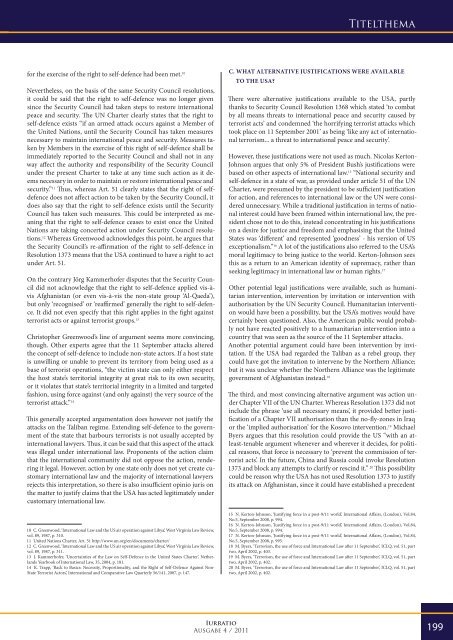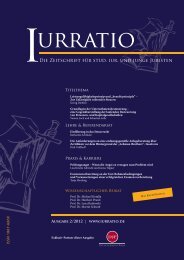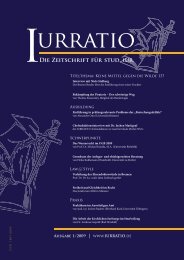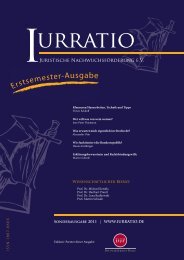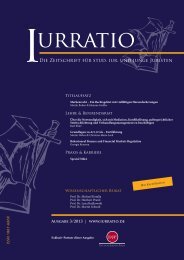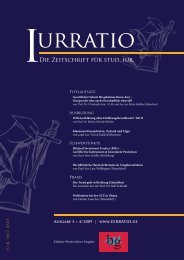Die Zeitschrift für stud. iur. und junge Juristen - Iurratio
Die Zeitschrift für stud. iur. und junge Juristen - Iurratio
Die Zeitschrift für stud. iur. und junge Juristen - Iurratio
Sie wollen auch ein ePaper? Erhöhen Sie die Reichweite Ihrer Titel.
YUMPU macht aus Druck-PDFs automatisch weboptimierte ePaper, die Google liebt.
Titelthemafor the exercise of the right to self-defence had been met. 10Nevertheless, on the basis of the same Security Council resolutions,it could be said that the right to self-defence was no longer givensince the Security Council had taken steps to restore internationalpeace and security. The UN Charter clearly states that the right toself-defence exists “if an armed attack occurs against a Member ofthe United Nations, until the Security Council has taken measuresnecessary to maintain international peace and security. Measures takenby Members in the exercise of this right of self-defence shall beimmediately reported to the Security Council and shall not in anyway affect the authority and responsibility of the Security Council<strong>und</strong>er the present Charter to take at any time such action as it deemsnecessary in order to maintain or restore international peace andsecurity.” 11 Thus, whereas Art. 51 clearly states that the right of selfdefencedoes not affect action to be taken by the Security Council, itdoes also say that the right to self-defence exists until the SecurityCouncil has taken such measures. This could be interpreted as meaningthat the right to self-defence ceases to exist once the UnitedNations are taking concerted action <strong>und</strong>er Security Council resolutions.12 Whereas Greenwood acknowledges this point, he argues thatthe Security Council’s re-affirmation of the right to self-defence inResolution 1373 means that the USA continued to have a right to act<strong>und</strong>er Art. 51.On the contrary Jörg Kammerhofer disputes that the Security Councildid not acknowledge that the right to self-defence applied vis-àvisAfghanistan (or even vis-à-vis the non-state group ‘Al-Qaeda’),but only ‘recognised’ or ‘reaffirmed’ generally the right to self-defence.It did not even specify that this right applies in the fight againstterrorist acts or against terrorist groups. 13Christopher Greenwood’s line of argument seems more convincing,though. Other experts agree that the 11 September attacks alteredthe concept of self-defence to include non-state actors. If a host stateis unwilling or unable to prevent its territory from being used as abase of terrorist operations, “the victim state can only either respectthe host state’s territorial integrity at great risk to its own security,or it violates that state’s territorial integrity in a limited and targetedfashion, using force against (and only against) the very source of theterrorist attack.” 14This generally accepted argumentation does however not justify theattacks on the Taliban regime. Extending self-defence to the governmentof the state that harbours terrorists is not usually accepted byinternational lawyers. Thus, it can be said that this aspect of the attackwas illegal <strong>und</strong>er international law. Proponents of the action claimthat the international community did not oppose the action, renderingit legal. However, action by one state only does not yet create customaryinternational law and the majority of international lawyersrejects this interpretation, so there is also insufficient opinio juris onthe matter to justify claims that the USA has acted legitimately <strong>und</strong>ercustomary international law.10 C. Greenwood, ‘International Law and the US air operation against Libya’, West Virginia Law Review,vol. 89, 1987, p. 310.11 United Nations Charter, Art. 51 http://www.un.org/en/documents/charter/12 C. Greenwood, ‘International Law and the US air operation against Libya’, West Virginia Law Review,vol. 89, 1987, p. 311.13 J. Kammerhofer, ‘Uncertainties of the Law on Self-Defence in the United States Charter’, NetherlandsYearbook of International Law, 35, 2004, p. 181.14 K. Trapp, ‘Back to Basics: Necessity, Proportionality, and the Right of Self-Defence Against Non-State Terrorist Actors’, International and Comparative Law Quarterly 56/141, 2007, p. 147.C. WHAT ALTERNATIVE JUSTIFICATIONS WERE AVAILABLETO THE USA?There were alternative justifications available to the USA, partlythanks to Security Council Resolution 1368 which stated ‘to combatby all means threats to international peace and security caused byterrorist acts’ and condemned ‘the horrifying terrorist attacks whichtook place on 11 September 2001’ as being ‘like any act of internationalterrorism... a threat to international peace and security’.However, these justifications were not used as much. Nicolas Kerton-Johnson argues that only 5% of President Bush’s justifications werebased on other aspects of international law. 15 “National security andself-defence in a state of war, as provided <strong>und</strong>er article 51 of the UNCharter, were presumed by the president to be sufficient justificationfor action, and references to international law or the UN were consideredunnecessary. While a traditional justification in terms of nationalinterest could have been framed within international law, the presidentchose not to do this, instead concentrating in his justificationson a desire for justice and freedom and emphasising that the UnitedStates was ‘different’ and represented ‘goodness’ - his version of USexceptionalism.” 16 A lot of the justifications also referred to the USA’smoral legitimacy to bring justice to the world. Kerton-Johnson seesthis as a return to an American identity of supremacy, rather thanseeking legitimacy in international law or human rights. 17Other potential legal justifications were available, such as humanitarianintervention, intervention by invitation or intervention withauthorisation by the UN Security Council. Humanitarian interventionwould have been a possibility, but the USA’s motives would havecertainly been questioned. Also, the American public would probablynot have reacted positively to a humanitarian intervention into acountry that was seen as the source of the 11 September attacks.Another potential argument could have been intervention by invitation.If the USA had regarded the Taliban as a rebel group, theycould have got the invitation to intervene by the Northern Alliance;but it was unclear whether the Northern Alliance was the legitimategovernment of Afghanistan instead. 18The third, and most convincing alternative argument was action <strong>und</strong>erChapter VII of the UN Charter. Whereas Resolution 1373 did notinclude the phrase ‘use all necessary means’, it provided better justificationof a Chapter VII authorisation than the no-fly-zones in Iraqor the ‘implied authorisation’ for the Kosovo intervention. 19 MichaelByers argues that this resolution could provide the US “with an atleast-tenableargument whenever and wherever it decides, for politicalreasons, that force is necessary to ‘prevent the commission of terroristacts’. In the future, China and Russia could invoke Resolution1373 and block any attempts to clarify or rescind it.” 20 This possibilitycould be reason why the USA has not used Resolution 1373 to justifyits attack on Afghanistan, since it could have established a precedent15 N. Kerton-Johnson, ‘Justifying force in a post-9/11 world’, International Affairs, (London), Vol.84,No.5, September 2008, p. 994.16 N. Kerton-Johnson, ‘Justifying force in a post-9/11 world’, International Affairs, (London), Vol.84,No.5, September 2008, p. 994.17 N. Kerton-Johnson, ‘Justifying force in a post-9/11 world’, International Affairs, (London), Vol.84,No.5, September 2008, p. 995.18 M. Byers, ‘Terrorism, the use of force and International Law after 11 September’, ICLQ, vol. 51, parttwo, April 2002, p. 403.19 M. Byers, ‘Terrorism, the use of force and International Law after 11 September’, ICLQ, vol. 51, parttwo, April 2002, p. 402.20 M. Byers, ‘Terrorism, the use of force and International Law after 11 September’, ICLQ, vol. 51, parttwo, April 2002, p. 402.<strong>Iurratio</strong>Ausgabe 4 / 2011199


